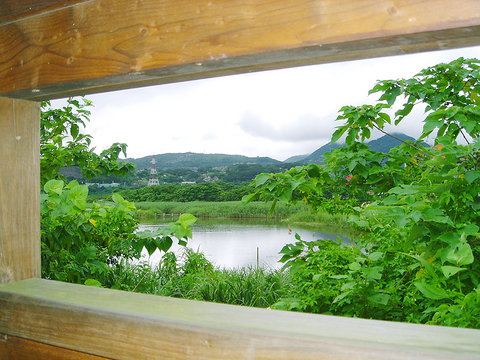Taipei has a vibrant cultural heart but little in the way of lungs, which is why the green expanse of Guandu Nature Park (關渡自然公園) is such a treasure.
An internationally recognized birding area, the park is home to over 830 species of animals, including 229 varieties of fowl.
Joining the flora and fauna this month are six installations from international artists, who have used natural materials to build their works and thereby focus attention on the environment.

PHOTO: JULES QUARTLY, TAIPEI TIMES
This is laudable, of course, and the 2006 Guandu International Outdoor Sculpture Festival, which opened a few weeks ago, provides a convenient hook for a day out to see one of the city's few natural hot spots.
If it's a weekend trip, try and beat the crowd by arriving at the Guandu Nature center in the morning. There's plenty to see in the exhibition and research halls, and the information will provide insight for what is to follow.
The 57-hectare nature park is in a low-lying part of the Taipei Basin, at the confluence of the Keelung and Danshui rivers. The mixture of salt and fresh water makes the area incredibly diverse from an ecological point of view. And this is what attracts the large variety of animals, plants and aquatic creatures.
Having come to terms with the dynamics of wetland eco-systems and learned to differentiate red mangrove from mango, it's time to move on and explore the outdoor observation area; take a trail through the park and check out twitchers in the bird-watching area.
The installations may be a tad disappointing if you're expecting a bold statement. For instance, US artist Jane Ingrame Allen's Nests for Humans are made from fallen branches and are similar to shelters that have been abandoned by picnickers elsewhere.
"These human-sized nests are for people to enter and rest there a while to think about man's relationship to nature and the wonder of a bird's creation," the artist says in a statement about her work.
Japan's Rikuo Ueda made a wind machine of paper and natural debris; while Yimuko Yamazaki floated a raft of soil onto a pond to find out what grows on it.
Having contemplated nature in the abstract it's time to get on your bike and tour the riverside bike trails. A shop nearby on Zhixing Road rents bicycles at around NT$50 per hour.
Take a deep breath and enjoy a trip to Guandu. It's easy to get to on the MRT and a pleasant change from the concrete jungle.
Guandu day out:
Where: Guandu Nature Park, 55, Guandu Rd, Beitou Dist, Taipei (台北市北投區關渡路55號).
Opening hours: March to October open 9am to 5pm on weekdays, 9am to 6pm on weekends. November to February, 9am to 5pm on weekdays, 9am to 5:30pm on weekends. The park is closed on Mondays.
Telephone: (02) 2858-7417.
On the Net: For a detailed map visit www.gd-park.org.tw/en/e1.htm
Pedal power: Chiang Hsian-chin (江憲欽) Bikes, 206 Zhixing Rd, Beitou District, Taipei (台北市北投區知行路206號). Call (02) 2858-7046.
On a prayer: Guandu Temple (關渡宮), 360, Zhixing Rd, Taipei (台北市北投區知行路360號). Call (02) 2858 1281.

A vaccine to fight dementia? It turns out there may already be one — shots that prevent painful shingles also appear to protect aging brains. A new study found shingles vaccination cut older adults’ risk of developing dementia over the next seven years by 20 percent. The research, published Wednesday in the journal Nature, is part of growing understanding about how many factors influence brain health as we age — and what we can do about it. “It’s a very robust finding,” said lead researcher Pascal Geldsetzer of Stanford University. And “women seem to benefit more,” important as they’re at higher risk of

Eric Finkelstein is a world record junkie. The American’s Guinness World Records include the largest flag mosaic made from table tennis balls, the longest table tennis serve and eating at the most Michelin-starred restaurants in 24 hours in New York. Many would probably share the opinion of Finkelstein’s sister when talking about his records: “You’re a lunatic.” But that’s not stopping him from his next big feat, and this time he is teaming up with his wife, Taiwanese native Jackie Cheng (鄭佳祺): visit and purchase a

April 7 to April 13 After spending over two years with the Republic of China (ROC) Army, A-Mei (阿美) boarded a ship in April 1947 bound for Taiwan. But instead of walking on board with his comrades, his roughly 5-tonne body was lifted using a cargo net. He wasn’t the only elephant; A-Lan (阿蘭) and A-Pei (阿沛) were also on board. The trio had been through hell since they’d been captured by the Japanese Army in Myanmar to transport supplies during World War II. The pachyderms were seized by the ROC New 1st Army’s 30th Division in January 1945, serving

Mother Nature gives and Mother Nature takes away. When it comes to scenic beauty, Hualien was dealt a winning hand. But one year ago today, a 7.2-magnitude earthquake wrecked the county’s number-one tourist attraction, Taroko Gorge in Taroko National Park. Then, in the second half of last year, two typhoons inflicted further damage and disruption. Not surprisingly, for Hualien’s tourist-focused businesses, the twelve months since the earthquake have been more than dismal. Among those who experienced a precipitous drop in customer count are Sofia Chiu (邱心怡) and Monica Lin (林宸伶), co-founders of Karenko Kitchen, which they describe as a space where they